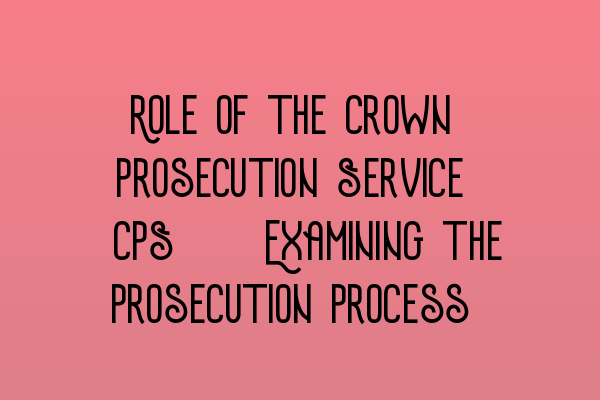The Role of the Crown Prosecution Service (CPS): Examining the Prosecution Process
The Crown Prosecution Service (CPS) plays a crucial role in the criminal justice system of the United Kingdom. As the principal prosecuting authority, the CPS is responsible for bringing criminal cases to court on behalf of the public. In this blog post, we will delve into the prosecution process and explore the important functions of the CPS.
Investigation Stage
Before a case can proceed to court, a thorough investigation must take place. It is the responsibility of the police to gather evidence and present it to the CPS for review. The CPS examines the evidence and decides whether there is sufficient basis to charge a suspect and commence legal proceedings. This initial stage is crucial, as it ensures that cases with insufficient evidence do not proceed, avoiding unnecessary strain on the courts.
During the investigation stage, it is imperative for the police to adhere to strict guidelines to ensure that evidence is collected lawfully and ethically. Any breach of these guidelines may result in the evidence being deemed inadmissible in court. Additionally, the CPS may request further evidence or investigation to strengthen the case before making a final charging decision.
Charging Decision
Once the CPS has reviewed the evidence provided by the police, a charging decision is made. This decision is guided by the Code for Crown Prosecutors, which sets out the criteria for prosecuting a criminal case. The Code requires the CPS to consider the following factors:
- The evidence available and whether it is reliable and admissible in court
- The public interest in bringing a prosecution
- Whether a prosecution is likely to be successful based on the evidence and the public interest
- Any special measures required to support vulnerable or intimidated witnesses
It is crucial for the CPS to make fair and objective decisions in accordance with the Code for Crown Prosecutors. This ensures that only cases with sufficient evidence and public interest are brought to court, preventing the unjust prosecution of innocent individuals.
Preparing for Trial
Once a charging decision has been made, the CPS works alongside the police and other investigating agencies to prepare the case for trial. This involves gathering additional evidence, interviewing witnesses, and consulting experts if necessary. The CPS also takes on the responsibility of presenting the case in court and working with the court to ensure a fair and expeditious trial.
During the preparation stage, the CPS works closely with the defense to disclose all evidence in a timely manner, as required by the Criminal Procedure and Investigations Act 1996. This promotes transparency and allows the defense to effectively prepare their case.
Role in Court
As the prosecuting authority, the CPS represents the public interest in court. Prosecutors present the case to the jury or judge, calling witnesses, and cross-examining the defense witnesses. They also address legal issues and make submissions to the court regarding the admissibility of evidence.
The CPS must act impartially and act as a gatekeeper of justice, ensuring that the defendant receives a fair trial and that justice is served. The prosecutor must make the case against the defendant, presenting the evidence and legal arguments clearly and effectively.
Conclusion
The role of the Crown Prosecution Service (CPS) in the criminal justice system cannot be overstated. From the investigation stage to the court proceedings, the CPS plays a crucial role in ensuring the fair and effective prosecution of criminal cases. By adhering to the Code for Crown Prosecutors and upholding the principles of justice, the CPS works tirelessly to maintain public trust and confidence in the criminal justice system.
If you found this post informative, you may also be interested in reading the following related articles:
- Demystifying the Solicitors Qualifying Examination Format
- LLC Formation Made Simple: Step-by-Step Guide for UK Entrepreneurs
- Business Regulations in the UK: A Comprehensive Overview
- Preparing for the SQE Exam: Strategies and Resources for Success
- SQE Workshops and Webinars: Accelerate Your Exam Preparation
